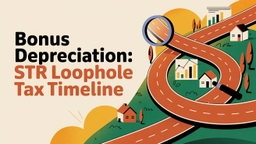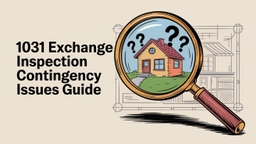Long-term rental owners can dramatically boost returns by swapping into short-term rentals (STRs) via a 1031 exchange. A 1031 like-kind exchange lets you defer all capital gains taxes on the sale of an investment property by reinvesting proceeds into a new property. When that replacement is an STR (like an Airbnb), you unlock the STR loophole: the new property’s losses (especially from depreciation) can become “non-passive” and offset active income. In practice, this means you defer gains and convert losses into an active business deduction, while also resetting depreciation with cost segregation and bonus deductions. The result is a powerful tax and cash-flow strategy. Below are the key steps and benefits:
- Step 1: Execute a 1031 Exchange. Sell your investment property and/or old rental and reinvest proceeds into an STR property without paying capital gains or depreciation-recapture tax today. The full equity (that would otherwise go to taxes) rolls into the new purchase, increasing your buying power.
- Step 2: Operate as a Short-Term Rental. If the average rental period is 7 days or less (or up to 30 days with significant personal services), the IRS does not treat the property as a rental activity. When you materially participate in managing the STR, losses become non-passive and may offset W-2 or other active income. This treatment is unique to STRs and is available even if you are not a Real Estate Professional.
- Step 3: Supercharge Depreciation. Perform a cost segregation study on the new property. This breaks up the purchase price into 5‑, 7‑, and 15‑year assets, most of which you can deduct immediately with bonus depreciation. (Notably, new law reinstates 100% bonus depreciation for property placed in service after January 19, 2025). A 1031 exchange carries over your old basis into the new property. However, if you buy a more expensive property, the additional ‘excess basis’ qualifies for a fresh depreciation schedule and can be allocated to shorter-life assets in a cost segregation study. Only the excess basis is eligible for new bonus depreciation. Contact a cost-segregation specialist for FREE to maximize these deductions.
- Step 4: Increase Cash Flow and Wealth. Airbnb rentals typically command much higher rents than long-term leases. For example, one analysis shows Airbnbs can yield $38K/year in Florida peak season vs $27.9K for a comparable long-term rental, as reported by Baselane. Combined with tax deferral, this means more free cash today. And because your taxes are deferred, you can continue growing your portfolio without interruption. For help finding the right property, connect with an STR-focused real estate agent.
By flipping a long-term rental into a short-term rental with a 1031, a landlord combines three compounding benefits: deferred capital gains, higher operating income, and massive upfront tax deductions. While many investors think they must choose between deferring gains with a 1031 or taking large depreciation deductions, under the right conditions you can benefit from both, deferred taxes on the sale and new depreciation on the excess basis in your replacement STR.







